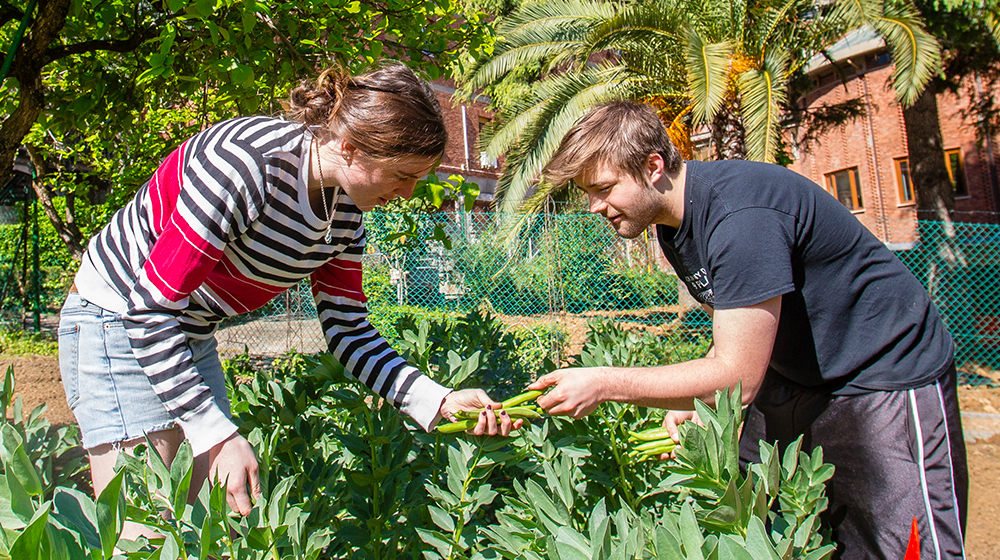Sustainability

Everywhere you look, the John Felice Rome Center is using the latest technology to protect our planet. The water you drink, the energy you use, even the stuff you throw away—it's all evidence of our commitment to sustainability.
Renewable Energy
- Two photovoltaic plants reduce electric consumption.
- Solar panels mounted on each roof of the JFRC buildings.
- A photovoltaic plant that generates hot water.
- The new building and chapel were built using X-LAM Cross-Laminated Timber Technology: environmentally friendly and reduces energy consumption.
- Rainwater harvesting (RWH) is used for non-potable purposes such as watering the grounds.
Accessible Recycling & Composting
- Recyclable materials bins are located throughout the building and on campus grounds.
- Together with the City of Rome, plastic, aluminum, glass, and paper recyclables are picked up three to four times a week.
- In addition to encouraging students to use the bins for organic waste, yard waste and waste generated by our food service providers is collected by the City of Rome.
- Bottle top collection bins can be found on campus. These bottle tops are donated to Dall’acqua per l’acqua, an association that uses them to fund the creation of water supply systems in Africa.
- Collection bins for toner and ink cartridge recycling.
Other Green Practices
We encourage all members of our community to employ good practices and have put into place some tools to aid in good practice.
- Water fountains throughout campus to cut down on the use of disposable bottles.
- Minimized disposable products in the cafeteria.
- At the end of each semester, students donate items that they no longer need (clothing, books, toiletries, school supplies) to charity.
- Drying racks are available in every dorm room to encourage students to hang dry their laundry instead of using the dryers.
- Lights in public bathrooms on campus are activated by motion detectors.
- All public bathrooms on campus have electric hand dryers instead of paper towels. (Note: Current COVID-19 guidelines forbid use of hand dryers; we will reinstate hand dryers when this is no longer the case).
- Eco-friendly disposal of medical waste and battery waste carried out by a certified medical waste removal company.
Renewable Energy
- Two photovoltaic plants reduce electric consumption.
- Solar panels mounted on each roof of the JFRC buildings.
- A photovoltaic plant that generates hot water.
- The new building and chapel were built using X-LAM Cross-Laminated Timber Technology: environmentally friendly and reduces energy consumption.
- Rainwater harvesting (RWH) is used for non-potable purposes such as watering the grounds.
Accessible Recycling & Composting
- Recyclable materials bins are located throughout the building and on campus grounds.
- Together with the City of Rome, plastic, aluminum, glass, and paper recyclables are picked up three to four times a week.
- In addition to encouraging students to use the bins for organic waste, yard waste and waste generated by our food service providers is collected by the City of Rome.
- Bottle top collection bins can be found on campus. These bottle tops are donated to Dall’acqua per l’acqua, an association that uses them to fund the creation of water supply systems in Africa.
- Collection bins for toner and ink cartridge recycling.
Other Green Practices
We encourage all members of our community to employ good practices and have put into place some tools to aid in good practice.
- Water fountains throughout campus to cut down on the use of disposable bottles.
- Minimized disposable products in the cafeteria.
- At the end of each semester, students donate items that they no longer need (clothing, books, toiletries, school supplies) to charity.
- Drying racks are available in every dorm room to encourage students to hang dry their laundry instead of using the dryers.
- Lights in public bathrooms on campus are activated by motion detectors.
- All public bathrooms on campus have electric hand dryers instead of paper towels. (Note: Current COVID-19 guidelines forbid use of hand dryers; we will reinstate hand dryers when this is no longer the case).
- Eco-friendly disposal of medical waste and battery waste carried out by a certified medical waste removal company.
